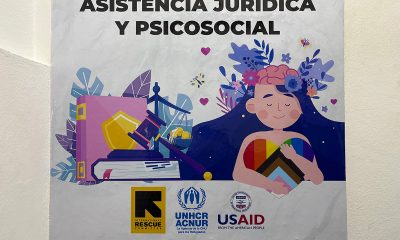South America
Peruvian capital’s mayor-elect raises eyebrows among LGBTQ activists
Rafael López Aliaga is an Opus Dei member

Lima earlier this month elected a new mayor to lead Peru’s most populous city.
Rafael López Aliaga, a conservative businessman, narrowly defeated his opponent in a campaign marked by fervent opposition to communism and progressive values. After his victory, Lima’s LGBTQ community may have cause for concern.
A devout Catholic, López, also known as RLA, is a member of Opus Dei who has practiced self-flagellation and celibacy ever since he joined the conservative Catholic sect when he was 19-years-old.
“Just as a homosexual cannot impose his life on anyone, so too he would be crazy to impose his beliefs on all of Peru,” López has said.
However, his views on social issues closely mirror rightwing Christian doctrine.
He is staunchly against abortion, marriage equality and “gender ideology” and has railed against all three on Twitter. He has also decried the supposed “homosexualization” of Peruvian children.
The mayor-elect, though, is perhaps distinct in some respects among conservative politicians on the continent.
López has endorsed domestic partnerships for same-sex couples and has claimed he would hire a “transsexual” if they were the best person for the job. López has also contrasted himself from Brazilian President Jair Bolsonaro.
“Bolsonaro insults the gay community,” López has said. “I am inclusive, the community must be welcomed.”
The veracity of his “inclusivity,” though, is up for debate.
Peruvian writer and political scientist José Alejandro Godoy is unconvinced.
He told the Washington Blade that López has been cautious with regard to what he is saying on LGBTQ-related topics. Godoy fears that with López’s election, a rollback of LGBTQ human rights is imminent. According to the political scientist, anti-discrimination ordinances and the permissions granted to Lima’s Pride Parade may be on the line.
Indeed, there is reason to believe that the fight for LGBTQ rights in Lima is taking a turn for the worse.
Throughout October, Lima has been a hotbed of anti-trans activism. Coordinated in part by leading members of Congress and Popular Renewal, López’s political party, the city has experienced “anti-gender ideology and pro-family” protests.
Popular Renewal Congressman Alejandro Muñante, who is the Peruvian Congress’ third vice president, and CitizenGO, a rightwing activist group, on Oct. 3 managed to get a truck to enter the front of Peru’s parliamentary headquarters with the message: “OAS: Women are defined by biology, not by ideology.”
Targeting the Organization of American States at its 52nd General Assembly, Muñante and CitizenGO have been campaigning against international efforts to push for a more diverse definition of gender. The following day, on Oct. 4, Popular Renewal sent a letter to the Peruvian Foreign Minister opposing abortion and rejecting any OAS document which may force Peru to “grant improper recognition to transsexual men and grant them the rights of women.” Finally, on Oct. 6, thousands took to the streets of Lima, marching against abortion and gender ideology. Muñante promoted the march and López retweeted coverage of it.
Jazmín Peña-Laurencio, a Peruvian human rights defense attorney, believes the LGBTQ community in Lima should not lose hope.
Municipal ordinances that protect against gender and LGBTQ discrimination have been hard-won by the community, she explains.
“Although Congress does have the power to eliminate these protections, the citizenry would not allow it, as the problem [of LGBTQ discrimination] has been made very visible compared with a few years ago,” she said.
Peña-Laurencio said the community should continue fighting for visibility, as that allows many sectors of society to join the fight and not see LGBTQ discrimination as a niche issue. Activists from Lima agree with the lawyer’s approach.
Manuel Ramirez-Gomez, an activist from Lima and host of a popular LGBTQ podcast, is similarly optimistic about the future of his city. He says that López’s election is nothing new; his community has always felt fear as minorities in the conservative city. However, according to the podcaster; LGBTQ activists in Lima plan to continue organizing, marching and fighting until their rights are fully recognized.
Enrique Vega-Dávila, a queer pastor and academic, echoes Ramirez-Gomez’s sentiment.
“This is not the first time we’ve had a diversity-phobic mayor,” Vega-Dávila told the Blade. “LGBTTTIQ activism has never been easy in Peru. The conservative society in our country has made the closet an alternative to the possibility of fighting for our rights. The RLA administration will surely try to undermine our right to appear in public spaces, but we have been fighting anti-human rights groups for a long time and will continue to do so.”
Despite the activists’ efforts, not all are as optimistic about the possibility for progress in Lima under a López administration.
Godoy explained to the Blade that Popular Renewal won a majority in Lima’s Metropolitan Council (El Concejo Metropolitano.)
“Unfortunately, I don’t think any progress towards LGBTI rights in Lima is currently possible,” Godoy told the Blade. “I’m not only saying this because of Popular Renewal’s majority but also due to the fact that other parties who have won seats have not been inclined to defend the LGBTI agenda.”
Combined with President Pedro Castillo’s unsympathetic, leftist federal administration, the prospects for Lima’s LGBTQ community are not looking bright.
López is set to replace Lima’s incumbent mayor when his term ends on Dec. 31.
Chile
Transgender woman sues Chilean national police
Isabella Panes alleges she suffered harassment, exclusion after becoming ‘carabinera’

Isabella Panes in 2022 was celebrated as a symbol of inclusion.
Wearing an olive green uniform and a shy smile, she appeared in the media and on social media as Chile’s first trans female “carabinera” or national police officer. The Carabineros promoted Panes as a sign of openness, but that story has become a dramatic case of institutional discrimination.
Panes today faces the Carabineros in court.
She has denounced a series of systematic acts of exclusion, harassment at work, and violation of fundamental rights that she and her defense team maintains pushed her into a mental health crisis that almost cost her her life.
“My hope is that tomorrow we will be able to live in a world of equality for all. Just that we understand that we are human beings and we have to make life a lot easier for each other,” Panes told the Washington Blade during an exclusive interview.
Panes, 29, grew up in Laja in the Biobío region.
She dreamed of becoming a “carabinera” since she was a child, despite the fact that she faced discrimination because of her gender identity. After years of effort, surgeries and a difficult transition, Panes enrolled in the Carabineros Academy in 2021.
Panes faced the challenge of making her medical processes compatible with the physical demands of training. Even so, she graduated with good marks, and was recognized as part of the new institutional image the Carabineros wanted to project after the 2021 social unrest tarnished their image.
This institutional support disappeared after the media campaign.
Panes alleges she was marginalized from operational duties and relegated to administrative tasks, despite her interest in and training to patrol the streets like any other officers.
“I joined the Carabineros to serve, not to be a marketing decoration,” she said. “I was offered to be part of the change, but only if I kept quiet and accepted the mistreatment.”
The accusations against the Carabineros are serious: Constant mockery by colleagues, dissemination of private information about her personal life, invasive questions about her body and sexual orientation. Panes’s legal representatives said this abuse took place within a context where the institution did not take effective measures to protect their client.
The Carabineros Social Security Administration, known by the Spanish acronym Dipreca, also refused to cover her transition-related medical procedures, arguing they were “aesthetic,” despite medical reports that indicated their importance for Panes’s mental health and well-being.
Panes in January attempted to kill herself by suicide. She managed to survive after calling Chile’s 4141 mental health care number for help.
“They were killing me slowly, from the inside,” said Panes.
Panes has brought her case to the Supreme Court after a lower court ruled in favor of Dipreca’s decision to not cover her medical treatments.
Her legal team in a lawsuit has also accused the Carabineros of employment and systematic discrimination. Panes is seeking damages and institutional reforms.
“The Carabineros used Isabella to clean up its public image, but when it came to guaranteeing real rights, they abandoned her,” said Javiera Zúñiga, spokesperson for the Movement for Homosexual Integration and Liberation, a Chilean advocacy group.
“It is not enough to show up at the Pride march,” she added. “True inclusion is demonstrated in deeds, in daily dealings, in respect for the dignity of all people.”
Panes’s case starkly exposes the limits of diversity policies when there is no deep institutional commitment to implement them.
“I am no longer afraid,” said Panes, ”What happened to me cannot happen again. Not for me, but for all those who come after me.”
Brazil
US lists transgender Brazilian congresswoman’s gender as ‘male’ on visa
Erika Hilton has represented São Paulo since 2022

A transgender Brazilian congresswoman says the U.S. issued her a visa that listed her gender as “male.”
Erika Hilton on Wednesday wrote on her Instagram page that she requested a visa that would have allowed her to travel to the U.S. in order to participate in the Brazil Conference at Harvard University and the Massachusetts Institute of Technology.
The conference took place earlier this month.
“I was classified as ‘male’ by the U.S. government when I went to get my visa,” wrote Hilton, who added a visa she received from the U.S. in 2023 listed her gender as “female.”
Hilton is a Black travesti and former sex worker from São Paulo who won a seat in the Brazilian Congress in 2022. The Washington Blade spoke with Hilton shortly after her election.
“It is a big responsibility … but I feel very honored,” said Hilton. “I very much like to be able to be a representative for my people, and the more than 250,000 people who voted for me have confidence in me,” she said after she spoke at a rally in support of now Brazilian President Luiz Inácio Lula da Silva in a São Paulo square. “This demonstrates that our work has the potential to have a gigantic reach; where we can advance efforts to end death, poverty, misery, genocide that we have.”
President Donald Trump in his inaugural speech announced the federal government’s “official policy” is “there are only two genders, male and female.” The Trump-Vance administration has also banned the State Department from issuing passports with “X” gender markers.
Germany and Denmark are among the countries that have issued travel advisories for trans and nonbinary people who plan to visit the U.S. These warnings come ahead of WorldPride, which is scheduled to take place in D.C. from May 17-June 8.
Hilton said she is “not surprised” the U.S. issued her a visa with a male gender marker.
“I’m also not surprised by the level of hatred and fixation these people have with trans people,” she said. “After all, the documents I presented are rectified, and I’m registered as a woman, even on my birth certificate.”
Hilton further accused the U.S. of “ignoring official documents from other sovereign nations, even from a diplomatic representative.”
“At the end of the day, I’m a Brazilian citizen, and my rights are guaranteed and my existence is respected by our own constitution, legislation, and jurisprudence,” she said.
Editor’s note: Duda Salabert, another transgender Brazilian congresswoman, also said the U.S. listed her gender as “male” on her American visa.
Argentina
Gay, nonbinary parent fights for family in Argentina’s courts
Leonardo Hatanaka alleges they were fired after requesting paternity leave

An unprecedented case could set an important legal precedent for the rights of labor rights for LGBTQ families in Latin America.
Leonardo Hatanaka, a Brazilian pharmaceutical professional, expects an imminent ruling from the Superior Court of Justice in the Autonomous City of Buenos Aires in a case that alleges discriminatory dismissal based on sexual orientation, gender identity, and xenophobia after their son Matteo’s birth in Argentina via “solidarity gestation.” Human rights organizations and international agencies have followed the case closely.
Genzyme de Argentina S.A. and Sanofi in 2023 fired Hatanaka weeks after they notified them of their son’s paternity and requested 180-day parental leave.
“Matteo’s birth was the realization of a dream and the right to form a family with love, dignity and equality, even if that means having to fight every day for our family to be recognized as such,” Hatanaka told the Washington Blade in an exclusive interview.
The National Institute Against Discrimination, Xenophobia and Racism, a government agency known by the acronym INADI that President Javier Milei’s administration has shut down, in November 2023 said Hatanka’s termination was motivated by discrimination based on sexual orientation and gender identity.
(Milei took office in December 2023.)
The General Directorate of Coexistence in Diversity in Buenos Aires’s government in 2024 said institutional xenophobia motivated the firing.
“I am a gay man, foreign, nonbinary, and I had requested to exercise my right to parental leave,” Hatanaka explained. “The company denied access to a basic right to care, which it does provide in other countries, and did not provide any medical coverage for our son, despite his legal registration with both parents’ names.”
Sanofi did not acknowledge responsibility, offer apologies or any kind of reparations, despite the two rulings.
“It was devastating. I was caring for a newborn, at a moment of enormous vulnerability, and the company chose just that moment to abandon us,” said Hatanaka.
The National Labor Court overturned an initial injunction that ordered Hatanaka’s reinstatement. Hatanaka appealed the decision to the Superior Court of Justice in the Autonomous City of Buenos Aires.
“I hope for justice; that the discrimination suffered is recognized, and that this ruling serves as a precedent for all diverse families and LGBTQ+ people who are seeing their rights violated,” said Hatanaka.
The Argentine LGBT Federation, SOS Homophobie in France, and Mothers of Resistance in Brazil are among the organizations that have expressed their support. The latest U.N. report on anti-LGBTQ discrimination also notes the case.
“Companies must go beyond marketing,” Hatanaka emphasized. “Real inclusion requires concrete actions, consistency, and respect for their own policies.”
Hatanaka stressed that “there are instruments such as the UN Guiding Principles on Business and Human Rights. It is time for them to comply with them.” The lawsuit has also become a symbol of the struggle for equality and protection of families with parents who are the same sex.
“I feel I represent many LGBTQ+ families who live in fear of losing everything by exercising their rights,” said Hatanaka. “LGBTQ+ parenting is legitimate, real and deserves protection. No family should be punished for existing.”




















